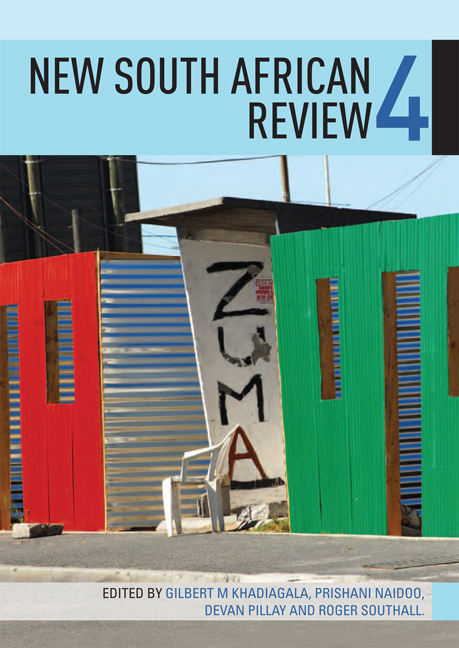Book contents
- Frontmatter
- Contents
- Preface
- Introduction: South Africa's fragile democracy: Twenty years on
- PART ONE ECOLOGY, ECONOMY AND LABOUR
- PART TWO POWER, POLITICS AND PARTICIPATION
- PART THREE PUBLIC POLICY AND SOCIAL PRACTICE
- PART FOUR SOUTH AFRICA AT LARGE
- Introduction
- Chapter 15 South Africa in Africa: Groping for leadership and muddling through
- Chapter 16 South Africa and Israel: From alliance to enstrangement
- Chapter 17 South Africa's economic ties with north-east Asia
- Chapter 18 Regional parastatals within South Africa's system of accumulation
- Chapter 19 The leadership challenge in Southern Africa
- Contributors
- Index
Introduction
from PART FOUR - SOUTH AFRICA AT LARGE
Published online by Cambridge University Press: 21 April 2018
- Frontmatter
- Contents
- Preface
- Introduction: South Africa's fragile democracy: Twenty years on
- PART ONE ECOLOGY, ECONOMY AND LABOUR
- PART TWO POWER, POLITICS AND PARTICIPATION
- PART THREE PUBLIC POLICY AND SOCIAL PRACTICE
- PART FOUR SOUTH AFRICA AT LARGE
- Introduction
- Chapter 15 South Africa in Africa: Groping for leadership and muddling through
- Chapter 16 South Africa and Israel: From alliance to enstrangement
- Chapter 17 South Africa's economic ties with north-east Asia
- Chapter 18 Regional parastatals within South Africa's system of accumulation
- Chapter 19 The leadership challenge in Southern Africa
- Contributors
- Index
Summary
The last twenty years of South Africa's democracy have been accompanied by bids to reorder its place in the world to conform to domestic changes. Twenty years is not a long time to inaugurate fundamental alterations to the lives of nations or people. The drama, expectations and fanfare that greeted the birth of South Africa's democracy produced momentous events around its transition that have endured. More accurately, the past two decades have been largely a long and extended transition in which South Africa has tried to overcome its troubled past and has forged new ways of managing multiple foreign policy challenges. The recent demise of former president Nelson Mandela marks a major milestone in the conclusion of the transition, ending an era in which South Africa has refined, redefined and experimented with various approaches to dealing with the rest of the world. Widespread outpourings of grief and celebrations following Mandela's death in large measure underscored South Africa's indelible imprint on the global stage. In death, as in life, Mandela continued to exemplify the deep moral imagination and triumph against adversity that post-apartheid leaders and generations have invoked as templates for the present and future. By the same token, however, Mandela's departure ends the protracted transition, the triumphalism, and the optimism that have dominated South Africa's global dalliance. Foreign policy makers can now operate in normalised circumstances of framing national and international priorities without being too encumbered by the past. In the normalcy of the post-Mandela era South Africa will probably continue to find new ways of projecting power and realigning national and global interests.
Despite the absence of significant shifts in foreign policy, the pattern of South Africa's engagement with the world witnessed small steps for furnishing leadership on African affairs, particularly in the construction of continental institutions: broadening alliances with new actors in the global North and South and jettisoning some of the commitments established by the apartheid government. These opportunities were, however, overshadowed at times by South Africa's inability to remake the world in its own image and by the constraints arising from partnerships with countries having questionable democratic and human rights credentials. Over the years, the combination of opportunities and constraints invariably yielded foreign policy pragmatism translated into toning down its global reach, reducing overexposure to some issues, and stepping down from the moral pedestal.
- Type
- Chapter
- Information
- New South African Review , pp. 272 - 274Publisher: Wits University PressPrint publication year: 2014

